Publications
 We author and publish a range of resources to keep you up to date with the latest developments in employment, labour market and human resource policy and practice.
We author and publish a range of resources to keep you up to date with the latest developments in employment, labour market and human resource policy and practice.
All our pdf publications are free to access.
Search results
-

Women in London's Economy
GLA | Dec 2005 | Greater London AuthorityThis research for the Greater London Authority (GLA) showed that by 2016, it was expected that women would fill seven out of ten new jobs in London, with an extra half a million jobs in the capital. The main key sectors for growth in women's employment during the decade were predicted to be in business service and also health, education, and retail. The GLA commissioned IES to carry out and report on the qualitative research detailed in this report.
-
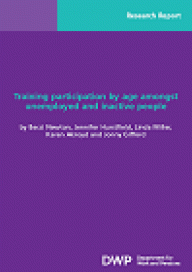
Training Participation by Age Amongst Unemployed and Inactive People
Newton B, Hurstfield J, Miller L, Akroyd K, Gifford J | Oct 2005 | Department for Work and PensionsThis project examined the evidence relating to training by age amongst people who were unemployed or economically inactive. The focus was on all adults aged between 16 and state pension age. This report presents the findings of three strands of research: a review of the evaluation and academic literature; analyses of the Labour Force Survey 2004 and National Adult Learning Survey 2002; and 22 interviews with individuals from 16 organisations with in-depth knowledge of the topic.
-
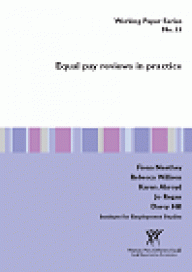
Equal Pay Reviews in Practice
Neathey F, Willison R, Akroyd K, Regan J, Hill D | Jun 2005 | Equal Opportunities CommissionThis report sets out the findings of a qualitative study of organisations' experiences of conducting equal pay reviews (EPRs). It is based on findings from 15 case studies which involved interviews with employer, trade union and line management representatives who had been involved in conducting an EPR.
-
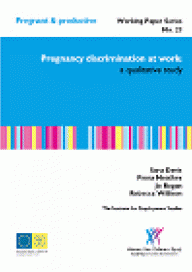
Pregnancy Discrimination at Work
A Qualitative Study
Davis S, Neathey F, Regan J, Willison R | Jan 2005 | Equal Opportunities CommissionThe findings of this study into pregnancy-related discrimination illustrate the breadth of issues that come up during working women's pregnancies and the common threads of their experience, in spite of different backgrounds.
-
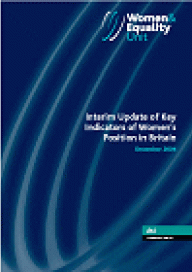
Interim Update of Key Indicators of Women's Position in Britain
Aston J, Clegg M, Diplock E, Ritchie H, Willison R | Dec 2004 | Women and Equality Unit, Department of Trade and IndustryIn November 2002, the Women and Equality Unit published Key Indicators of Women's Position in Britain (2002). It provided a set of key indicators across many aspects of women's lives, established benchmarks against which women's progress could be measured over time, and presented factual material to feed into public debate and policy-making. This report provides updates to the tables and figures presented in Key Indicators (2002), using the most recently available data at the time of writing. This publication is no longer available.
-
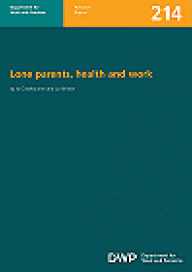
Lone Parents, Health and Work
Casebourne J, Britton L, Morrin M | Jul 2004 | Department for Work and PensionsThis report brings together two pieces of qualitative research examining the impact of health problems on lone parents' decisions about work. In 2003 and 2004, 112 interviews and six focus groups were carried out with lone parents. The research examines the complex relationship between health and work for lone parents and determines whether there is more that can be done to support lone parents with health problems and, in particular, to help them enter the labour market.
-
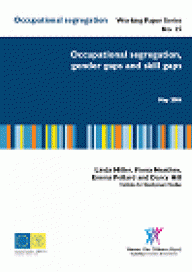
Occupational Segregation, Gender Gaps and Skill Gaps
Miller L, Neathey F, Pollard E, Hill D | Apr 2004 | Equal Opportunities CommissionAs the first stage of a programme of research to investigate gender segregation IES carried out a review of research and an analysis of labour market and training statistics in five occupational areas where there were skills shortages. This publication is no longer available.
-
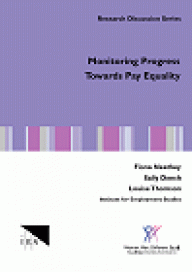
Monitoring Progress Towards Pay Equality
Neathey F, Dench S, Thomson L | Feb 2003 | Equal Opportunities CommissionThis research examines the extent of gender equality in the pay structures and pay practices of larger organisations. It focuses, in particular, on equal pay reviews. This publication is no longer available.
-
📄
New Deal 50plus: Sustainability of Employment
Atkinson J, Evans C, Willison R, Lain D, van Gent M | Jan 2003 | Department for Work and PensionsThis research sought to assess the longer-term outcomes of ND50plus, and specifically to ask how far clients had stayed in work after the wage top-up provided by the Programme had expired. This publication is no longer available.
-
📄
Key Indicators of Women's Position in Britain
Dench S, Aston J, Evans C, Meager N, Willison R, Williams M | Oct 2002 | Cabinet Office, Women and Equality UnitThe aim of this project was to identify a set of key indicators for mapping women's position relative to that of men across a wide range of areas, and to draw together reliable and robust statistics from different sources, to provide a comprehensive baseline for monitoring progress. It also outlined recent trends in these indicators, so future changes could be put into context. This publication is no longer available.
